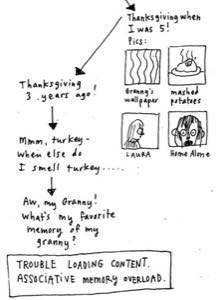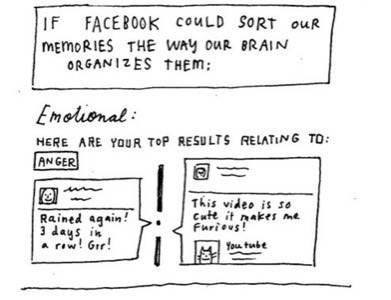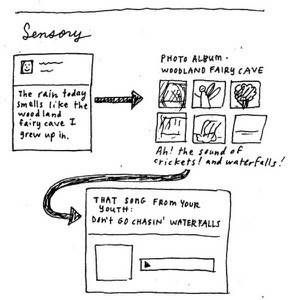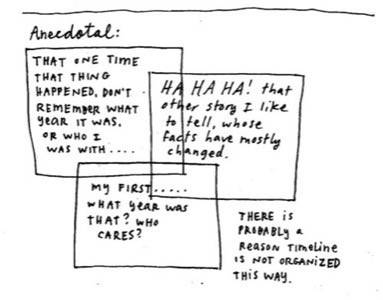I have been using Facebook less. I don’t care as much about what my friends are up to on the Internet, I guess. I’ve been calling people more, and emailing. It actually feels a lot better. But one morning I logged on to Facebook and noticed a thought-provoking status update from comic artist Corrine Mucha. It was one of those moments-of-frustration type Facebook status updates that we have all done, at one point or another. “Timeline, I refuse thee! Your understanding of time is just so linear! UGH,” she wrote on March 1. I stopped my scrolling, and clicked like on the status. Corinne’s post made me think twice about how I was thinking about time, and specifically Facebook Timeline. I have converted over to it, but haven’t had the time or interest to fill it in.

What if time on Facebook isn’t, and shouldn’t be, considered linear? Yes, events have happened, birthdays and anniversaries occur at the same time every year. We can rely on Christmas, Thanksgiving and New Year’s Eve happening every year. Those are constants. But that’s not what I’m talking about. I’m referring to the split between memories that seem appropriate to share on social networks, and those that do not. Events that have to do with a specific timeframe, and emotional events that do not. It is in these moments that a linear timeline of your life feels obtuse.
Facebook’s monetization strategy revolves around personalized ads. What better way to bring in the big bucks than nudge users to think more about their consumer desires? And most people are thinking about those in terms of linear time. So, time on Facebook is entirely linear, right? No. Detach yourself from the fact that Facebook is making money off of the information that you willingly provide it and think about your own conception of time.
How should our Facebooked social lives should look? What could time look like if we weren’t trying to replicate our offline selves and actual events? What if we stopped lifestreaming and starting thinking?
What Were You Doing One Year Ago Today on Social Networks?
“Have you ever heard of Timehop.com?” Chicago artist James Greene asked me over coffee a few weeks ago, eyes wide with excitement. I began associating ideas – hop, time, bunnies hop, Easter is coming soon, what time is it anyway? I was spacing on ideas.
James sat still, waiting for a response. His iPhone sat on the table, not buzzing.
“No,” I replied. “And I don’t think I want to know about it.”
Timehop.com sounds like one of those dangerous self-reflective “services” that encourage users to think about themselves as they are seen on social networks by others, rather than actual offline self-reflection time. I thanked him for the recommendation, wrapped up our interview and went on my way to make some phone calls and catch a bus.
A few days later I found myself back at the computer, squinting at a screen and wondering why my new glasses hadn’t arrived yet. Curiosity got the best of me and I decided to check out Timehop.com. The service, I discovered, hooks into your Facebook and Twitter accounts, and pulls up what it is you were doing one year prior on that day. I’m used to gazing at my own virtual mirror on the Internet – and besides, Facebook already went through its strange adolescent phase of showing a user’s deleted status updates and what they were doing one year ago today. Did I really need to indulge again? I wrote James and told him that I decided to try out Timehop, against my own best self-interests. He wished me luck. To my surprise, my Timehop has been pretty boring. Here’s what it looks like for today, March 8, 2011.

As it turns out, Timehop is quite benign compared to Timeline – which of course seeks to catalogue a user’s entire life, as they see it on Facebook.
Facebook Time is Not Linear: An Interview with Comic Artist Corinne Mucha
“If I were to sit down and make a mental list of milestones in my life, I wouldn’t start backwards from today and start a checklist in the same way that Timeline does,” Chicago-based artist Corinne Mucha tells me via phone.
Take a major holiday, for example. On Facebook, it’s common to see posts surrounding a major holiday – but little more than “Happy Thanksgiving!” Or, for Christmas, perhaps a Peanuts comic or Mariah Carey song – something beyond just the proclamation “Merry Christmas!” This is an instance of events happening in the here and now on Facebook, in real-time, just like Facebook would like you to think about them. On Timeline, you can go back and add past holidays – but is it really just that simple?
“Maybe I’d start thinking about this past Thanksgiving- that’s a big event” begins Mucha. I can almost see the creative sparks flying in her head as she speaks, her words getting faster and faster. She is associating memories, one after the other.
“As soon as I think about Thanksgiving, I start thinking about every other Thanksgiving I’ve had – the ones I had as a kid, maybe a particular one three years ago…maybe there are family members that I only see on Thanksgiving, like certain cousins, and then my brain starts connecting other memories of them to this event. There’s sense memory too, like certain tastes, which reminds me of other times that I can taste those things or smell those same things. Associative memory is something that Timeline doesn’t really do.”


So, about Timeline. How does that change our conception of such a holiday?
“What if Timeline had the ability to display which kinds of memories that would be most interesting to you, depending on what you’re currently experiencing in your life?” asks Mucha. “Or what if you had the power to group them in certain ways, sorting them by things like their emotional color? And what about sensory memories? Anecdotal memories?”



What does Facebook do best? The linear types of memories, milestones, moments you want to remember.
Of course, remembering birthdays and holidays is easier and more marketable to Facebook. Anecdotal memories? Not so much.
“Those anecdotal memories are the kinds of stories whose dates and details seem to change every time we tell them,” she says.
One milestone that borders on anecdotal memory, for me, which perhaps wouldn’t work quite as well on Facebook Timeline, is losing my tattoo virginity. It was a moment marked in time that holds more emotional resonance than a holiday. It is the beginning of a body-marking era, a memory punched into time. It is a story. I don’t want to put it on my Facebook Timeline.

“People carry two sets of memories – memories that are appropriate for the public, and then something that is important to me but I wouldn’t share with the Internet,” says Mucha. “One of the things I think is really interesting about memory is allowing it to change and be incorrect as far as our personal memories go – and that’s not something Facebook allows a lot of room for.”

In the days of LiveJournal, Internet users shared their deepest secrets and desires with their Internet community. Those days, of course, are long gone – LiveJournal has become a fixture in Russia, after being sold to Russian Internet company SUP in 2009. In the U.S. today, people spend more time using Facebook and Twitter as their creative outlets. Of course, neither guarantee permanency, yet ask users to just continue posting content. In reality, Facebook is as ephemeral as sketches on scratch paper. Why would anyone upload their memories – associative or milestone or otherwise – to Facebook Timeline? It feels like a cheap way to catalogue, like slapping old photos into generic store-bought plastic photo albums.
Why would anyone upload their memories – associative or milestone or otherwise – to Facebook Timeline? It feels like a cheap way to catalogue, like slapping old photos into generic store-bought plastic photo albums.
“What if people are consciously developing two sets of memories in their minds?” asks Mucha. “You don’t want to have to create a ‘second Timeline.’ I mean, that’s what diaries are, personal photo albums.”
Images courtesy of Shutterstock, aliciaeler.com and maidenhousefly.com.
















